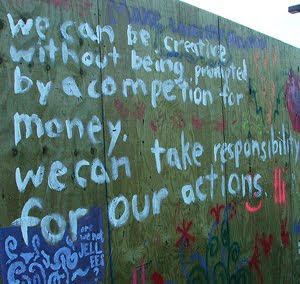Churches encourage members to engage in a wide array of discipleship programs and have committees to provide resources in spiritual disciplines, classes, and more. Olson and Friedrich acknowledge that discipleship is the domain of the church and we are comfortable with that.
Citizenship.
Schools and communities try and teach our children to be good citizens by participating in their communities and government. Vote! Know what your community is doing and how to advocate for change.
Olson and Friedrich challenge their readers to connect these two domains. Religious motivations should shape how one feels about affordable housing, childcare opportunities, health care for children, or fair wages for immigrant workers. Churches feel comfortable addressing and meeting the immediate needs of those in the community, yet are often uncomfortable digging deeper into the issue and asking why it is happening and what can be done about it on a public policy level.
Scripture reminds us that it is our work as advocates to speak. What would have happened if the Canaanite woman had not insisted her child was deserving of Jesus's attention and healing? Olson and Friedrich are clear - advocacy about power. Yet out baptismal vows boldly claim that as Christians we accept the power of God to resist evil and injustice. Therefore child advocacy, and all it entails from acts of mercy of feeding hungry families to acts of justice in fighting for affordable housing for families, is Christian Discipleship.
Here is a common metaphor to leave you with:
You are enjoying lunch along the river with your friends.
You hear someone yelling for help from the water.
You (with your mad lifeguard skills) jump in the river and save them.
A few minutes later, someone else is in the river needing your help again!
You jump back in and rescue them too.
A few minutes later, another person!
You are getting tired, but continue to rescue those in need.
When do you go upriver to look for who is pushing people in the river?
There will always be those who are in the river and need compassionate help to get out. Yet, others are called to the justice work of looking at the systems of oppression and working to keep people out of the river in the first place.
How can the church address both of these paths?
Peace,
Erin






